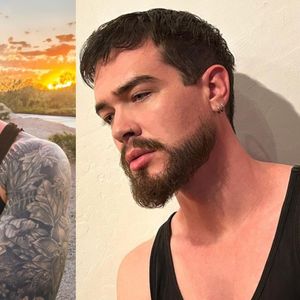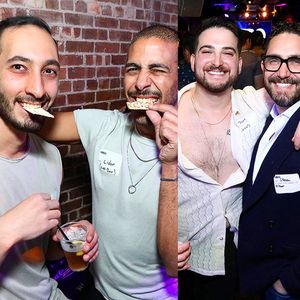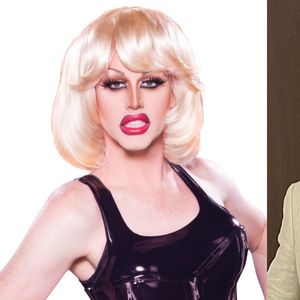
CONTACTStaffCAREER OPPORTUNITIESADVERTISE WITH USPRIVACY POLICYPRIVACY PREFERENCESTERMS OF USELEGAL NOTICE
© 2024 Pride Publishing Inc.
All Rights reserved
All Rights reserved
By continuing to use our site, you agree to our Private Policy and Terms of Use.
In the abstract history can be fascinating. When you have lived the history, experience's emotional layers can act as blinders, obscuring the larger picture; relative objectivity is a challenge.
Thirty years ago the first article on AIDS appeared in The New York Times. As is often the case, we didn't know in the moment that our lives would never be the same.
The brilliant revival of The Normal Heart on Broadway brings it back -- a flood of memory and feeling. The gay community was caught up by a tsunami of fear, conjecture, and uncertainty. By the mid '80s, sudden deaths and struggle were commonplace. I remember sipping from the same cup of coffee as my GMHC buddy, his body weakened by Karposi's sarcoma, and thinking, I may have just killed myself -- all bodily fluids were still suspect (HIV, carried by blood, had not been identified at that point). Yet I didn't refuse the proffered cup. I didn't want him to be an object of fear.
In tandem with the suffering, we were also experiencing extraordinary beauty. A community came together --those in the first wave, young gay men, were embraced by their brothers (and sisters). We found our soul. If liberation had inadvertently led us to a plague, we could bond together lovingly -- and effectively. I also remember this as a time of faith and celebration of life.
Crisis is always an opportunity to recalibrate our priorities. At the "front" in wartime, each moment is revealed in its value and clarity without the illusion that it comes with a guaranteed future. I know that those years broke my heart, but I also knew them as a time of wakefulness. I was not on my way to my life, I was in it. Time and again, I have observed that during crisis, life is oddly simple: One must do the next thing, then the next thing, then the next.
In the '90s, when I was critically ill, taking my next breath was my job. Accepting the kindness and practical support of family and friends was easy -- I could no longer "earn" their love, it was simply present.
On a personal level, I have no regrets about this part of my journey: I wouldn't be who I am today without all of it -- the loss, the not-knowingness, the aliveness that came from savoring the very day, accepting that some of us might not be here tomorrow.
Last night I was talking with a friend in his 20s and I was reminded of the ultimate gift: the realization that just being here to tell him the tale is enough. Being alive is the magic.
That place of simplicity can become obscured but is never fully forgotten. The grace is in remembering it without the need for yet another crisis.
Want more breaking equality news & trending entertainment stories?
Check out our NEW 24/7 streaming service: the Advocate Channel!
Download the Advocate Channel App for your mobile phone and your favorite streaming device!
From our Sponsors
Most Popular
Here Are Our 2024 Election Predictions. Will They Come True?
November 07 2023 1:46 PM
Meet all 37 of the queer women in this season's WNBA
April 17 2024 11:24 AM
17 Celebs Who Are Out & Proud of Their Trans & Nonbinary Kids
November 30 2023 10:41 AM
Here Are the 15 Most LGBTQ-Friendly Cities in the U.S.
November 01 2023 5:09 PM
Which State Is the Queerest? These Are the States With the Most LGBTQ+ People
December 11 2023 10:00 AM
These 27 Senate Hearing Room Gay Sex Jokes Are Truly Exquisite
December 17 2023 3:33 PM
10 Cheeky and Homoerotic Photos From Bob Mizer's Nude Films
November 18 2023 10:05 PM
42 Flaming Hot Photos From 2024's Australian Firefighters Calendar
November 10 2023 6:08 PM
These Are the 5 States With the Smallest Percentage of LGBTQ+ People
December 13 2023 9:15 AM
Here are the 15 gayest travel destinations in the world: report
March 26 2024 9:23 AM
Watch Now: The Daily
Trending stories from our video partner Advocate Channel.
For more videos and shows go to advocatechannel.com.
Trending stories from our video partner Advocate Channel.
For more videos and shows go to advocatechannel.com.
Latest Stories
George Santos pulls out of New York congressional race
April 23 2024 7:04 PM
Biden will hammer Trump over abortion bans in Florida speech
April 23 2024 5:00 AM
Tristan Snell, who brought down Trump University, sees conviction in hush money case
April 22 2024 7:36 PM
Joe Biden admin marks Earth Day with major environmental initiatives
April 22 2024 4:18 PM
Texas Gov. Greg Abbott: 'We want to end' trans and gender nonconforming teachers
April 22 2024 4:13 PM
Nonbinary 17-year-old killed two years after being reported missing
April 22 2024 3:46 PM


















































































